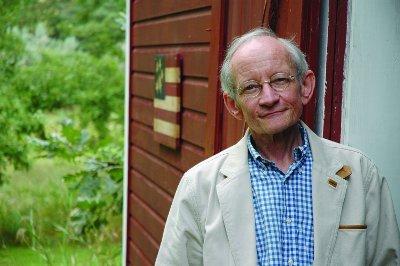Arts & Life
- Details
- Written by: Ted Kooser

Patrick Phillips lives in Brooklyn, but in every city, town and village, and at every crossroads, there’s an old guitar. Here’s one from Elegy for a Broken Machine, a fine book from Alfred A. Knopf.
The Guitar
It came with those scratches
from all their belt buckles,
palm-dark with their sweat
like the stock of a gun:
an arc of pickmarks cut
clear through the lacquer
where all the players before me
once strummed—once
thumbed these same latches
where it sleeps in green velvet.
Once sang, as I sing, the old songs.
There’s no end, there’s no end
to this world, everlasting.
We crumble to dust in its arms.
American Life in Poetry is made possible by The Poetry Foundation ( www.poetryfoundation.org ), publisher of Poetry magazine. It is also supported by the Department of English at the University of Nebraska-Lincoln. They do not accept unsolicited submissions. Poem copyright 2015 by Patrick Phillips, “The Guitar,” from Elegy for a Broken Machine, (Alfred A. Knopf, 2015). Poem reprinted by permission of Patrick Phillips and the publisher. Introduction copyright 2015 by The Poetry Foundation. The introduction's author, Ted Kooser, served as United States Poet Laureate Consultant in Poetry to the Library of Congress from 2004-2006.
- Details
- Written by: Tim Riley
ANT-MAN (Rated PG)
Good things can come in small packages, even smaller than the single-celled yellow organisms known as Minions, now so popular they have their own thrill ride at the Universal Studios theme parks in Orlando and Hollywood.
Another small package is Ant-Man, a unique superhero in the Marvel Cinematic Universe who, first introduced in the 1962 comic book “Tales to Astonish #27,” was a founding member of the Avengers.
Hank Pym appeared alongside the Avengers in the team’s debut in the 1963 “Avengers #1,” and became the Ant-Man after discovering a chemical substance called the Pym Particle, which allowed him to alter his size and possess superhuman strength.
That’s about as much history of the Ant-Man that I could put together, and I am sure the legion of Marvel Comics fans possess the complete knowledge to make their own assessments of Disney’s “Ant-Man,” starring the very likable Paul Rudd as the titular character.
Additionally, I couldn’t even begin to explain or comprehend the subtleties of the Marvel Comics universe, but that doesn’t mean that other similarly challenged viewers can’t enjoy “Ant-Man” for its pure fun.
The general public is fully aware of the superheroes like Iron Man, the Hulk, Captain America, Thor, Spider-Man, as well as the other team members behind the Avengers, the Guardians of the Galaxy and the Fantastic Four. Now Ant-Man finally gets his due.
As “Ant-Man” opens, context is provided with a flashback to 1989, when a younger Dr. Hank Pym (a digitally-rejuvenated Michael Douglas), opposed to any tinkering with his discovery, confronts his colleagues, including the oily Mitchell Carson (Martin Donovan) who figures into the action in present day.
The story begins in earnest in present time with Paul Rudd’s Scott Lang, a master thief being released from San Quentin prison, and reuniting with his best pal and ex-felon Luis (Michael Pena), who wants Scott to resume his old ways.
Trying to go legit, Scott takes a job at Baskin-Robbins, only to be fired when his prison record is made known. He’s desperate to stay out of trouble for the sake of his young daughter, now that his ex-wife (Judy Greer) has moved on with a new partner (Bobby Cannavale), a police officer hostile to Scott’s overtures.
Meanwhile, in the intervening years, Dr. Pym has seen his company fall under the control of his former protégé, Darren Cross (Corey Stoll), who now exhibits signs of megalomania and greed with his plan to turn Pym’s invention into the Yellowjacket, a weapon for nefarious purposes that he intends to sell to the odious Mitchell Carson.
With elaborate planning, Dr. Pym orchestrates a cat burglar job that involves Scott and his goofy cohorts stealing the Ant-Man suit from a nearly impenetrable vault, proving that Scott may be the one to don the mantle of a miniaturized hero to save the world.
If it were not for the sake of proving himself a worthy father to his daughter Cassie (Abby Ryder Fortson), Scott’s serious doubts about dwindling to the size of an insect would kill the whole deal.
As it is, Scott’s first shrinking experience with the power of the Ant-Man suit proves frightening, as he must survive the swirling waters of a bathtub, trekking through shag carpet, and not becoming a snack for a mouse.
This trial by fire convinces Dr. Pym that Scott is the right candidate for the superhero job, instead of his steely-eyed daughter Hope (Evangeline Lilly). Pym believes he is being protective of his only child, proving that Scott is not the only one with father-daughter issues.
The inevitable showdown with the odious Darren Cross (his shiny bald head making him look more than a villain in a James Bond film) comes not too fast, as time and care is taken to develop Scott’s newfound superhero skills.
Before Scott and his gang can pull off a big heist at Dr. Pym’s company headquarters, an extensive amount of training exercises allows Scott to adapt to the power of his costume, such as leaping from full size to being so small that he passes easily through a keyhole.
Reduced to the size of Ant-Man, Scott puts together an army of industrious ants, training them to do such things as to place sugar cubes in a cup of tea as if they were drones piling stone slabs to create an Egyptian pyramid.
Even though there is an interesting encounter with a member of the Avengers, the dynamic involved in “Ant-Man” is much more than the mentor-pupil relationship between Dr. Pym and Scott Lang, a situation which transcends the traditional Marvel Comics model of storytelling.
“Ant-Man” brings a fresher, lighter approach to the superhero franchise, with a titular character that is a vulnerable and somewhat reluctant recruit to the cause, yet proving to be a good guy despite his penchant for thievery and seeming inability to stay out of trouble.
More interested in character development, “Ant-Man” puts imagination and humor, along with dramatic tension between family members, above the inevitable annihilation of the bad guys.
In short, “Ant-Man” is a lot of fun, even for the casual viewers of the Marvel Comics film franchise.
Tim Riley writes film and television reviews for Lake County News.
- Details
- Written by: Ted Kooser

Surely, some of you have paged through an old book and come upon a dried flower, fragile as a spider web, the colors faded.
Here’s a fine poem about pressing flowers by Chelsea Woodard of New Hampshire, from her book Vellum.
The Flower Press
It was the sort of thing given to little girls:
sturdy and small, round edged, wooden and light.
I stalked the pasture’s rough and waist-high grass
for worthy specimens: the belle amid the mass,
the star shaming the clouds of slighter,
ordinary blooms. The asters curled
inside my sweat-damp palms, as if in sleep. Crushed
in the parlor’s stifling heat, I pried
each shrinking petal back, and turned the screws.
But flowers bear no ugly bruise,
and even now fall from the brittle page, dried
prettily, plucked from memory’s hush.
American Life in Poetry is made possible by The Poetry Foundation ( www.poetryfoundation.org ), publisher of Poetry magazine. It is also supported by the Department of English at the University of Nebraska-Lincoln. They do not accept unsolicited submissions. Poem copyright 2014 by Chelsea Woodard, “The Flower Press,” from Vellum, (Able Muse Press, 2014). Poem reprinted by permission of Chelsea Woodard and the publisher. Introduction copyright 2015 by The Poetry Foundation. The introduction's author, Ted Kooser, served as United States Poet Laureate Consultant in Poetry to the Library of Congress from 2004-2006.
- Details
- Written by: Ted Kooser

One of the first uses of language must surely have been to tell others what happened beyond the firelight, out in the forest. And poems that do just that seem wonderfully natural and human to me.
Here’s Anya Krugovoy Silver telling us something that happened far from home. She lives and teaches in Georgia.
Doing Laundry In Budapest
The dryer, uniform and squat as a biscuit tin,
came to life and turned on me its insect eye.
My t-shirts and underwear crackled and leapt.
I was a tourist there; I didn’t speak the language.
My shoulders covered themselves up in churches,
my tongue soothed its burn with slices of pickle.
More I don’t remember: only, weekends now
when I stand in the kitchen, sorting sweat pants
and pairing socks, I remember the afternoon
I did my laundry in Budapest, where the sidewalks
bloomed with embroidered linen, where money
wasn’t permitted to leave the country.
When I close my eyes, I recall that spinning,
then a woman, with nothing else to sell,
pressing wilted flowers in my hands.
American Life in Poetry is made possible by The Poetry Foundation ( www.poetryfoundation.org ), publisher of Poetry magazine. It is also supported by the Department of English at the University of Nebraska-Lincoln. Poem copyright ©2014 by Anya Krugovoy Silver, “Doing Laundry in Budapest,” from I Watched You Disappear: Poems, (Louisiana State Univ. Press, 2014). Poem reprinted by permission of Anya Krugovoy Silver and the publisher. Introduction copyright 2015 by The Poetry Foundation. The introduction's author, Ted Kooser, served as United States Poet Laureate Consultant in Poetry to the Library of Congress from 2004-2006. They do not accept unsolicited manuscripts.
 How to resolve AdBlock issue?
How to resolve AdBlock issue? 




